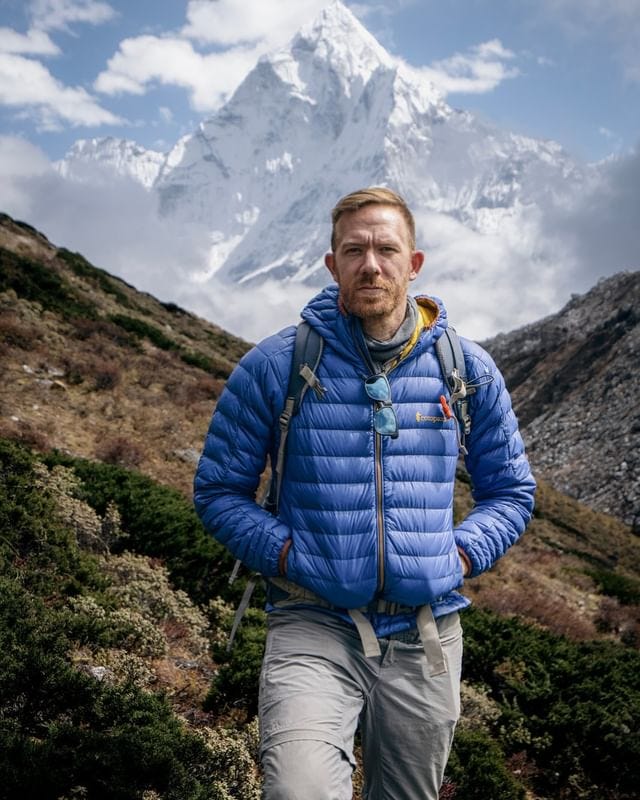Celeb Shot: Nelson Dellis
The Skidmore professor and six-time US Memory Champion has unlocked the key to a better memory—and life.

The first time I met Skidmore computer science professor Nelson Dellis, he was memorizing the credit card number of a fellow guest at Coat Room’s recent Masquerade Ball. Don’t worry, the guy asked him to do it; despite the fact that Nelson is a six-time US Memory Champion who could probably remember the 16-digit number forever if he wanted to, he doesn’t seem like the type to commit credit card fraud. After just a few seconds of looking at the card, Nelson handed the card back and easily recited the numbers, much to everyone around’s amusement.
But Nelson’s impressive memory is far more than a party trick. Sure, he holds the somewhat gimmicky Guinness World Record for memorizing a deck of cards underwater in the fastest time, and the US record for most random words memorized in 15 minutes (255 words). But he’s also used his skill to found a business that helps people improve their memory, as well as a nonprofit that uses mountain-climbing to raise awareness for Alzheimer’s disease.
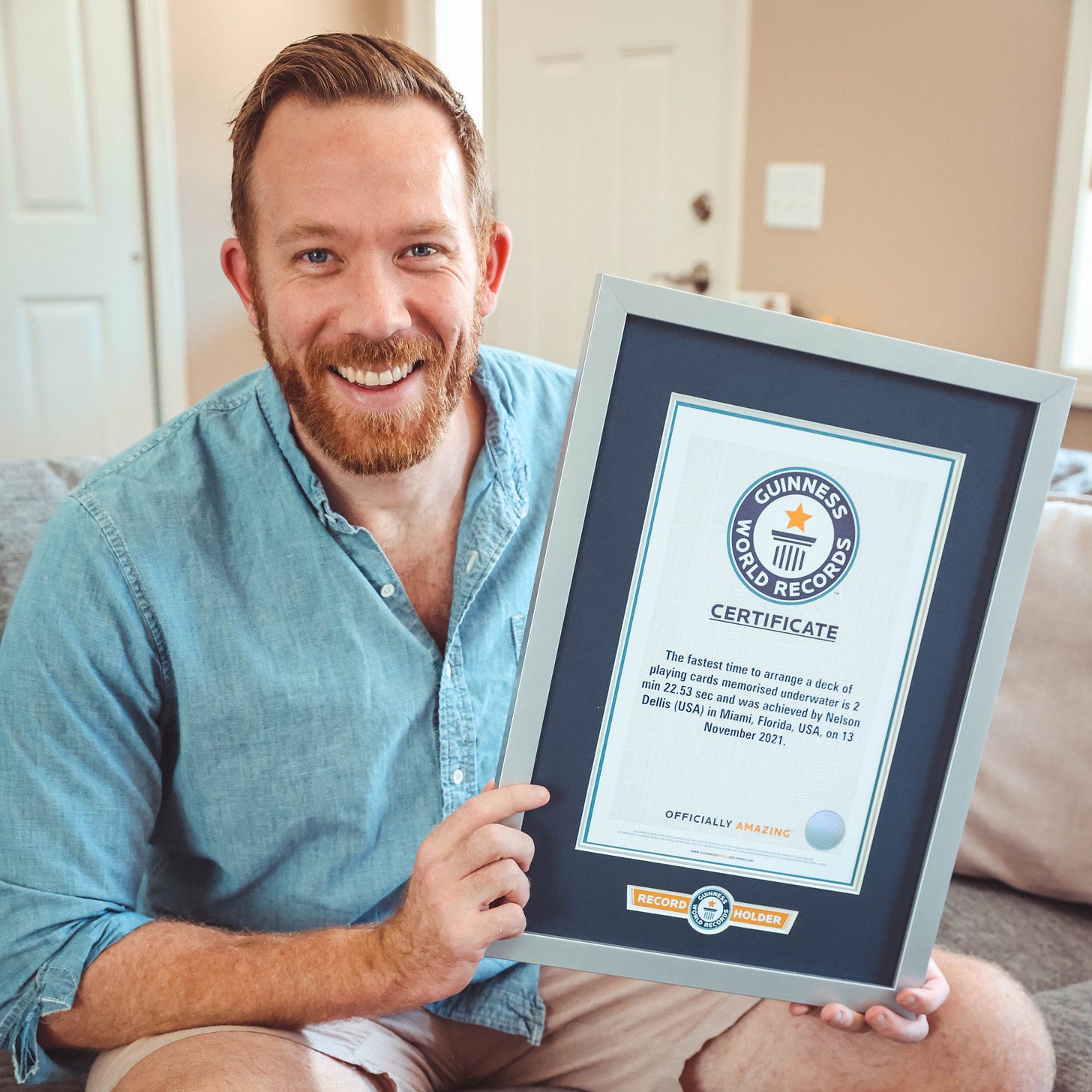
I caught up with the Saratoga transplant a couple of weeks after the Coat Room party (I admit, I forgot about our appointment; Nelson, unsurprisingly, did not). We chatted about what set him on the path to becoming a memory champion, the ways in which improving your memory can improve your life, and how he is raising money and awareness for Alzheimer’s by shouting his message from the mountaintops (literally). I recorded our conversation, so I wouldn’t forget:
SLAH: What exactly is a memory championship?
ND: The US Memory Championship is a bunch of different memory events: how fast you memorize a deck of cards, how many digits can you memorize in five minutes, how many names can you memorize in 15 minutes. There are different events, and it’s all random information, so it’s not like we have to study something in advance.
SLAH: How did you originally get into memory competitions?
ND: My grandmother had Alzheimer’s; she eventually passed away in 2009 from it. And that got me motivated to do something about my brain health. I was young, and it’s not like I had memory problems, but I didn’t want to end up like that. I was curious as to what I could be doing now to set me up down the road, and that’s when I stumbled upon memory techniques and memory competitions. I was like, oh, it must be for people who are savants or have photographic memories or something like that. And I learned very quickly that it was just people who trained. It’s like playing the piano, or getting stronger—you go to the gym, and you work out.
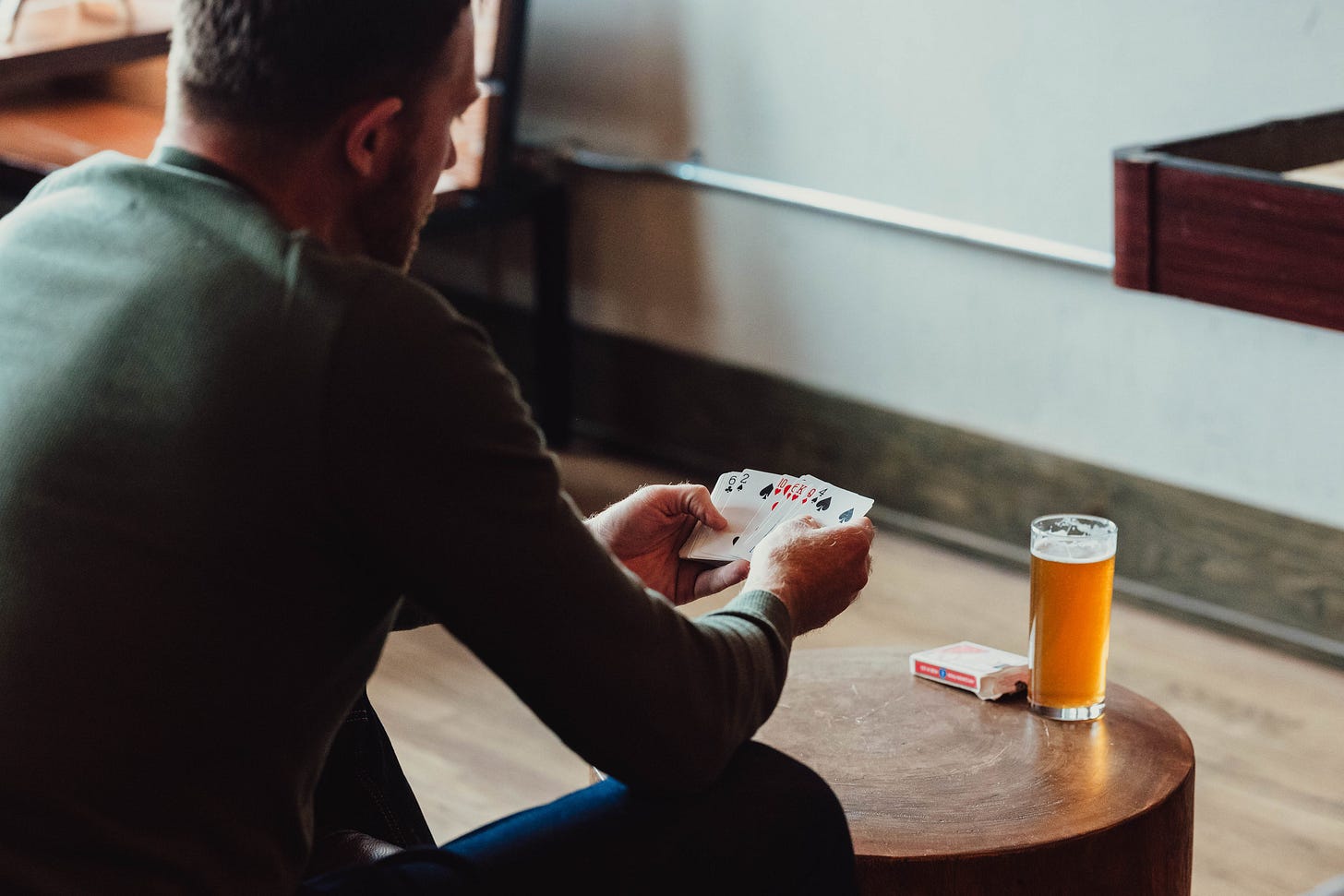
SLAH: You now teach people how to train their mind. What are some of the strategies?
ND: I teach how to think differently about information that comes at you. Take the information that you’re trying to memorize and turn it into a mental picture that’s meaningful to you. You look at a 20-digit number, and maybe some of the numbers are your birthday, or maybe 7 1 1 is like a 7-Eleven. But for a jumble of numbers long enough, you’re not going to have meaning for everything. So we train a system where I can look at any number and have an image that comes to mind. When I hear a phone number or when looked at that guy’s credit card number, I don’t see the numbers. I see this lively movie in my head.
That’s the first part. The second part is what do you do with those images? Because you still have to recall them—and where are they? A big problem about people and their memories is they don’t have a method to store information. When people say they have a bad memory, usually they know that they know something. Like, if somebody forgot your name, and you said it’s Natalie, they’d be like, oh, that’s right. There’d be that familiarity, which means it’s in there—they just couldn’t connect the wires to get it. And that’s an organization problem.
SLAH: Now, is this different for short-term vs long-term memory?
ND: That’s the third part: You have the visualization and the storage part, but then there’s the idea about whether you want to keep it for the short term or long term. Our brains are designed to forget stuff—it’s what they do. Otherwise, we’d be burdened by all the stuff we don’t need to remember. But if you review the information, it doesn’t fade as much. And if you rehearse it again, it stays for even longer. The nice thing about having a strategy to convert the information to pictures and store it correctly is that you can do the review really easily in your mind without having to look at the textbook that you’re studying over and over again.
SLAH: Is your wife always asking you to remind her of stuff?
ND: She’ll actually tell you that I’m forgetful. She’ll ask me to get two things from the grocery store and I’ll come back with one. But I tell her, listen—if you want me to remember two things, you’ve got to bury them in a list of 50 things, because I’ll remember the 50 things backwards and forwards.
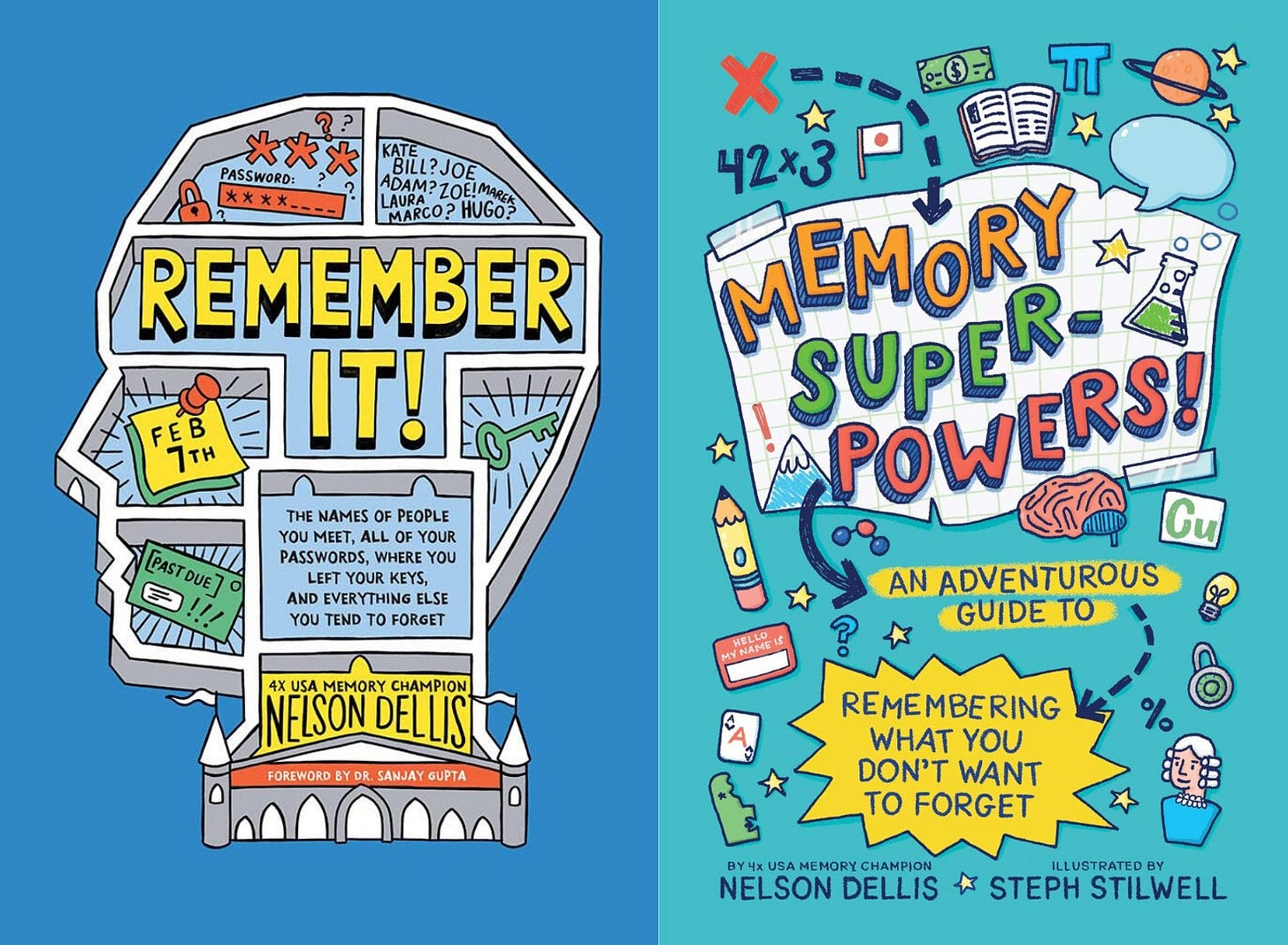
SLAH: This all started because of your grandmother’s Alzheimer’s. Has research shown that training your mind can help prevent the disease?
ND: There’s non-conclusive evidence. They’ve done studies on people who become cabbies in the UK and have to learn the map of London. Their hippocampus grew from that studying period alone. And there are other studies that show that people with a larger-than-normal hippocampus don’t get Alzheimer’s, or if they do, it’s later in life. But it’s hard to know fully if it’s just memory, or lifestyle. I could be the memory champion and have the most stressful life, eat terribly, and still get Alzheimer’s. But I like to think that I’m setting myself up with tools so that if it does end up happening to me, I have a way to stave it off for a bit.
SLAH: In addition to being a Skidmore professor and memory champion, you’re also an avid mountain-climber. Where does that fit into the equation?
ND: Climbing became a quiet passion of mine around the time I started the memory stuff. Over time I realized that not many people knew about memory techniques. I had to explain, and people would be fascinated. Obviously, I started teaching it, but I also wanted to bring it back to the reason I started, which was my grandmother. So it was like, how can I bring attention to this in a really loud way? I was like, oh, what about climbing? If I went to the top of the world, I could shout this message. One of my first big fundraisers was around this 2011 expedition on Mount Everest I did. I did that for a few years and then eventually it formed into Climb for Memory.
SLAH: Obviously, the techniques you teach will help in a memory competition, but in what ways has memory work impacted your daily life?
ND: When I started, I was going for job interviews. I could remember things in the conversation and bring them back up, and it looked really impressive. Now, I teach at Skidmore, so just remembering things about my students. It’s very day-to-day stuff that seems small, but it ultimately builds connections and relationships. Another thing it definitely helps with is confidence in being out in the world dealing with information. I don’t have anxiety over a conversation—like, am I gonna remember this? That’s not a problem. I can actually be present and focus on the moment.
—Natalie
Video of the Week
Thanksgiving might have been whiteout, but one local family didn’t let that stop them from getting out on—and in—Lake George. On Thursday, Mohawk Honda President Jeff Haraden posted this video of wake surfing in the snow storm; later that evening, he posted another of his family going in the lake for a late-night swim.
On the Run
Hundreds of other winter weather warriors took to downtown Saratoga for the 23rd annual Christopher Daily Foundation Turkey Trot, which was a fair bit snowier than it has been in recent years. Troy’s Turkey Trot, on the other hand, saw mostly rain.
’Tis the Season

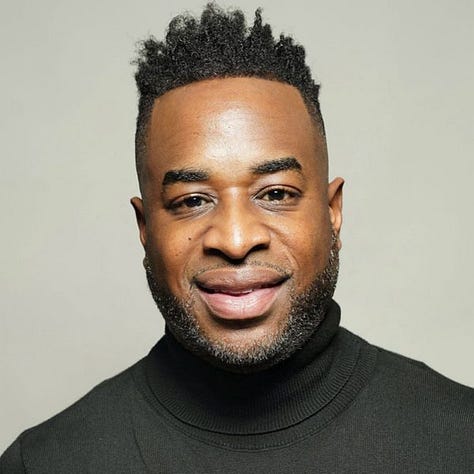
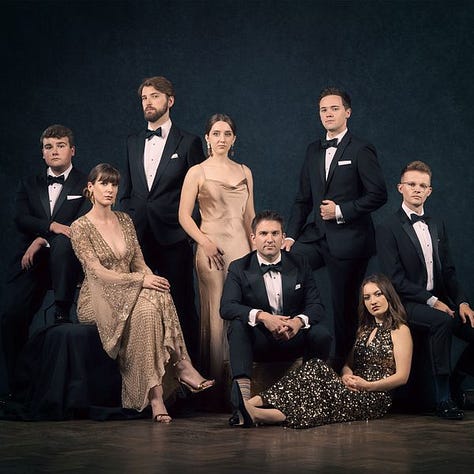
With Thanksgiving in the rearview, SPAC is gearing up for Sounds of the Season, a three-performance holiday series coming to the Spa Little Theater December 13-15. Kicking off the series on December 13 is the Grammy- and Emmy-winning trio Time for Three, back by popular demand after last year’s Sounds of the Season performance. “SPAC, the town of Saratoga and the beautiful, live music–loving community have collectively become a second family to Time for Three over the years,” says Time for Three’s Nick Kendall. “This program features the fun, heartfelt and immersive sound of our instruments mixed with vocals that you all know us for. You’ll hear holiday faves mixed in with Time for Three originals and covers. We can’t wait to be back!”
The following day, multi-genre recording artist and instrumentalist Damien Sneed will present A Gospel Holiday featuring his original arrangements of gospel, jazz and holiday classics; and on December 15, Grammy-nominated British a cappella group VOCES8 will present its Winter Tales program with holiday music spanning centuries. All shows are at 7pm. Get tickets here.
New Brew
This week, mybeerbuzz revealed three new brews coming to Tree House Brewing’s portfolio: Big Chocolate, an imperial stout; Berry Bliss, a mixed fermentation ale; and Hello, Saratoga, an American IPA that pays tribute to the brewery’s Spa City location, which is rumored to open for online order pickup in December and fully later this winter.
Not-so-black Friday
This week, while many stores were busy promoting Black Friday deals, one Saratoga boutique took an active stance against the holiday. “Gentle reminder that we DO NOT believe in b**** f*****,” Supernatural posted on Instagram, “but will open at 10am on fri/sat and offer a gorgeous gift with purchase throughout the weekend to thank you for continuing to shop small, independent, ethical, sustainable, and supernatural✨ #antiblackfriday.”
Closing Time
This weekend is your last chance to get your favorite burger from Broadway’s BurgerFi before the location closes for good. The franchise owners, who also own the brand’s Latham location, decided not to renew their franchise agreements after BurgerFi International Inc. filed for bankruptcy in September. “We’re grateful to our loyal customers and dedicated team members who have supported us over the years,” co-owner Bill Lia told NEWS10 ABC. “Their patronage and hard work have been essential to our journey. While we’re saying goodbye to BurgerFi, we look forward to exploring new possibilities for these two great locations.”
ICYMI
Hamlet & Ghost Team to Open New Wine Bar on Phila Street
Capital Region Holiday Calendar: Let the Good Times Stroll




